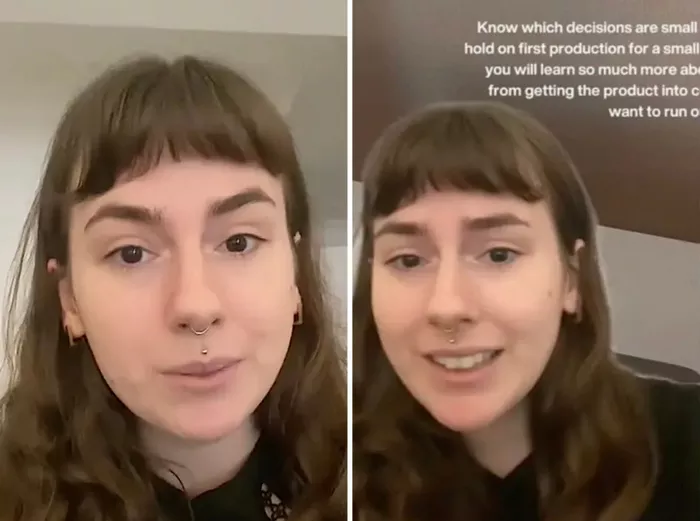A TikTok user is calling out entrepreneur and former fitness influencer Grace Beverley after she shared a post about her business philosophy that has raised concerns regarding the sustainability and quality of her sportswear brand, Tala.
Mia Westrap, who has over 54,000 followers, expressed her disappointment with Beverley’s Instagram post, which she said left “a really bad taste” due to the stance on the brand’s business practices. Tala, which markets itself as an eco-conscious line aiming to avoid the issues of fast fashion while maintaining affordability, had been praised for its sustainability focus, but Westrap highlighted a contradiction in the recent post.
In the post, Beverley shared a slide from a carousel titled “Things I wasted money on as a baby CEO.” One of the points she made was about avoiding “too many rounds of sampling,” suggesting that future products would be released in an imperfect state and refined based on consumer feedback.
Westrap criticized this approach, stating, “This is the thinking behind consumption at the moment that is making us all just buy crap that breaks, falls apart in the wash, it’s single-use — or very low amounts of use.” She added that when people spend money on clothing, it should be as close to perfect as possible, especially if it’s not a necessity.
Westrap also pointed out that Beverley’s philosophy is not unique to her and is shared by other brands, emphasizing that while it might be financially beneficial in the short term, it ultimately results in customers receiving poor-quality products that are quickly discarded — a key problem with fast fashion.
One TikTok user commented, “I have a Tala tracksuit. Cost a fortune, very poor quality … and the fabric is not soft or nice at all. Haven’t bought anything else from them since.”
Fast fashion has long been criticized for its environmental impact. Earth.org reports that clothing sales have doubled since 2000, but the average number of times an item is worn has decreased by nearly 40%. As a result, the world is disposing of enough textiles each year to fill a garbage truck every second, contributing to the release of methane gas and microplastics that harm the planet.
Tala’s website states that the brand was founded with sustainability in mind, asking the question: “If you could buy the same quality activewear at the same price, but made in an environmentally and socially conscious way, wouldn’t you?” However, the brand also acknowledges the challenges of balancing sustainability with affordability, describing sustainability in fashion as a complex, nuanced issue deeply tied to systemic problems around consumerism, privilege, and capitalism.
The site emphasizes that sustainability is a “progressive journey” rather than a fixed goal, and they aim to be specific about their actions instead of simply claiming to be sustainable.
Despite this, Westrap felt that Beverley’s post reflected an approach that contradicted Tala’s original sustainability promise, leading her to believe that the brand was engaging in greenwashing — giving the illusion of being environmentally responsible without making real efforts.
A TikTok user commented, “They are in no way sustainable anymore with the amount of new products they bring out all the time!!”
Despite these criticisms, Tala has introduced the ReTala initiative to combat waste. Customers who have purchased items from Tala can return worn-out products for free via the program, which aims to resell, repurpose, and recycle used items to reduce waste. Participants can also receive discount vouchers, and the returned products are sold at a discount.
Other companies, such as Madewell, Levi’s, and Lululemon, also offer similar rewards programs for returning used items. Additionally, Trashie offers users the chance to clean out their closets and earn credits redeemable at various fashion companies and even luxury hotels.
For those looking to support more eco-friendly practices, there are numerous sustainable clothing brands and initiatives from major companies that help reduce fashion’s environmental footprint.
Related Topics
- How Cassey Ho Turned Her Target Apparel Line Into a Viral Success
- Georgia Amoore and Kentucky Women’s Basketball Team Showcase $250 Million Gift from Drake’s Clothing Brand
- Kristin Juszczyk Teams Up with Emma Grede to Launch Off Season—A Sports Apparel Brand Inspired by Juszczyk’s DIY Designs

